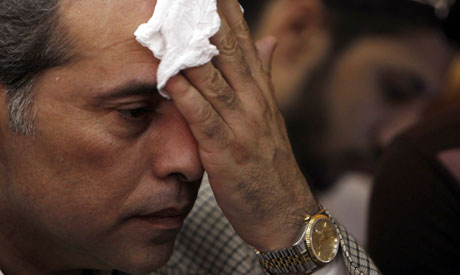
File Photo: Television presenter Tawfiq Okasha, who is also the owner of Egyptian television channel Al-Faraeen, wipes his forehead with a tissue during his trial in Cairo October 3, 2012 (Reuters)
Egypt's Minister of Parliamentary Affairs Magdi El-Agati and Ahmed Saadeddin, the secretary-general of the House of Representatives – Egypt's lower house parliament – decided Saturday not to allow high-profile TV anchor and MP Tawfik Okasha to hold a press conference to announce the formation of a new parliamentary bloc entitled the ‘Coalition of Independent MPs.’
El-Agati and Saadeddin ordered employees to shut down all the House's meeting rooms and the ‘Pharaonic Lobby’ so that Okasha or any other independent MP cannot hold a press conference. They also ordered security guards not to allow any television stations to enter the House to cover Okasha's conference.
Okasha told parliamentary reporters that he informed El-Agati and Saadeddin in advance of his intention to hold a press conference, which was aimed at announcing the details of the formation of the independent MP coalition a few days ahead of the start of the procedural session of the new parliament.
"They told me that the House is not the place to hold such a press conference," Okasha said, claiming that "there is a war in political and official circles against the formation of an independent parliamentary bloc."
Okasha told reporters that as the number of independent MPs in Egypt is 356, or 63 percent of parliament, they are authorised to form their own bloc so that they can speak as one voice in the coming parliament.
"But it seems that state and party officials do not want this bloc to be created at all," said Okasha. "Parliament now has 212 party-affiliated MPs (31 percent) and this minority wants to impose their say on the majority," argued Okasha.
"Each bloc is exerting pressure on independent MPs to join its ranks, not to defend the interests of independent MPs, but only to serve the political ambitions of its leaders," said Okasha, adding that "the last parliamentary elections were held in a democratic and transparent way and as a result the coming parliament should reflect diversity and should give independents a strong voice."
Okasha disclosed that he and a large number of independent MPs have been in negotiations in recent days to form the new bloc.
"I am not the one who proposed this idea but many independent MPs said the coming parliament should include an influential independent bloc," said Okasha. "As a result, I informed El-Agati and Saaeddin that independent MPs would come Saturday to announce the formation of such a bloc."
When asked why a small number of independent MPs showed up to the press conference, Okasha said, "a large number of MPs announced last Thursday that they would attend the conference, but it seems that they came under pressure from different authorities not to show up in parliament on Saturday."
Three independent MPs who showed up at the House – Ahmed Raslan, Salah Hasaballah and Ahmed Abaza – told reporters that they came to meet with Minister El-Agati rather than to attend a press conference with Okasha.
Another five independent MPs, hailing mostly from Okasha’s hometown of Daqahliya, visited the House on Saturday.
Okasha announced two weeks ago that he would run for the post of speaker of the new parliament as he was the candidate with the highest number of votes (92,000).
No sooner had Egypt's long-delayed parliamentary elections concluded on 16 December than a number of political forces began announcing the formation of different parliamentary blocs.
Topping the list is a bloc entitled the pro-Egyptian State Coalition. The bloc, formed by a number of high-profile MPs, primarily aims at defending the policies of President Abdel-Fattah El-Sisi in the new parliament.
Another bloc entitled the Pro-Egypt Coalition is being led by the liberal Wafd party, while the Social Justice Coalition is mainly composed of leftist and Nasserist forces.
Female MPs, reaching an unprecedented number of 87, also said they aim to form an independent bloc.
Amr Hashem Rabie, an Ahram political analyst, told Al-Ahram Online that the disappearance of a ruling party in Egypt after two revolutions left parliament without a dominant force.
"As a result, you see now different blocs are trying their best fill the political void left by the disintegration of [former president] Hosni Mubarak's ruling National Democratic Party and [former president] Mohamed Morsi's Freedom and Justice Party," said Rabie.
Rabie argued that political rivalries and personal ambitions are an obstacle in the way of forming coherent majority parliamentary blocs. "But I think that by time and due to the necessity of having consensus on some crucial issues, we might see two or three leading blocs in the coming parliament," said Rabie.
Okasha said that not only do independent MPs have the right to seek the formation of a bloc in Egypt's new house, but as a majority they should be authorised to be in charge of at least 10 parliamentary committees.
"Independent MPs should also be adequately represented in parliament's General Committee (which is in charge of setting the agenda of parliamentary debates and issuing crucial decisions), not to mention joining the Ethics Committee which is entrusted with imposing disciplinary measures on MPs.”
President El-Sisi is expected in few days to issue three decrees on the final formation of Egypt's new parliament. The first one will name a list of 28 (5 per cent) public figures to be appointed in the new parliament, to be followed by inviting MPs who won seats in recent elections to hold a procedural sitting to elect a speaker and two deputies. The third decree will be aimed at asking MPs to hold a plenary session to listen to a presidential speech on Egypt's current political and economic conditions.
Egypt's new parliament will comprise 596 MPs, the highest in the country's modern history.
Short link: